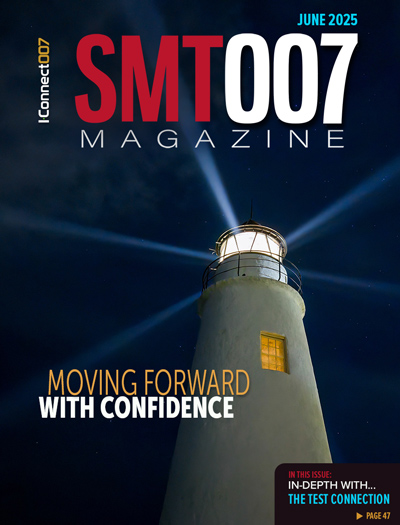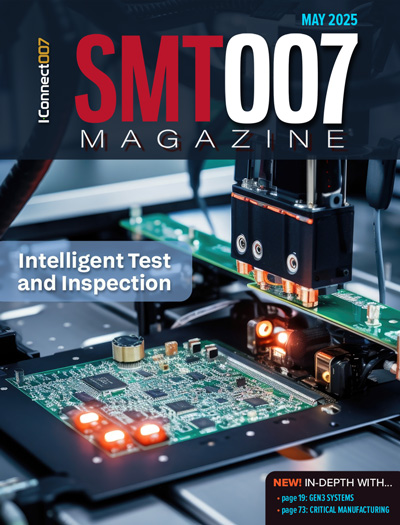-

- News
- Books
Featured Books
- smt007 Magazine
Latest Issues
Current Issue
What's Your Sweet Spot?
Are you in a niche that’s growing or shrinking? Is it time to reassess and refocus? We spotlight companies thriving by redefining or reinforcing their niche. What are their insights?

Moving Forward With Confidence
In this issue, we focus on sales and quoting, workforce training, new IPC leadership in the U.S. and Canada, the effects of tariffs, CFX standards, and much more—all designed to provide perspective as you move through the cloud bank of today's shifting economic market.

Intelligent Test and Inspection
Are you ready to explore the cutting-edge advancements shaping the electronics manufacturing industry? The May 2025 issue of SMT007 Magazine is packed with insights, innovations, and expert perspectives that you won’t want to miss.
- Articles
- Columns
- Links
- Media kit
||| MENU - smt007 Magazine
Navigating Global Manufacturing in an Era of Uncertainty
May 7, 2025 | Philip Stoten, ScoopEstimated reading time: 4 minutes
The EMS industry faces unprecedented challenges as global trade tensions rise and tariff announcements create market uncertainty. In an overview of IPC Europe’s podcast, MADE IN EUROPE, industry experts from GPV and Zollner examine how these developments impact our businesses and customers, and what strategies will prevail in this new landscape.
Stability in an Unstable World
President Trump's sweeping tariff announcements have sent wave after wave through global supply chains. In business, stability is paramount; companies need to know the rules of engagement and be confident they won't change overnight. The current climate has created what might be called a "decision vacuum," where many businesses pause major decisions while waiting for clarity.
"The most important thing is to stay calm, follow developments closely, and be agile when needed," says Bo Lybaek, president and CEO of GPV. "Business thrives on stability and predictability, knowing which playing field you're on and that it will remain consistent."
While the U.S. market navigates these challenges, it's important to recognize that business continues as usual in other regions. This underscores the value of diversified global operations that can weather regional disruptions.
The Region-for-Region Advantage
Perhaps the most significant trend accelerated by recent geopolitical shifts is the move toward regional manufacturing strategies. Having manufacturing capabilities in the same regions where products are sold has become increasingly important.
"As contract manufacturers, we need to establish production capabilities that allow us to serve customers locally with consistent service levels," says Markus Aschenbrenner, a member of the Executive Board at Zollner Elektronik AG. "This approach helps mitigate risks associated with cross-border trade disruptions."
Both GPV and Zollner have been expanding their global footprints accordingly. Zollner's investment in Costa Rica exemplifies this strategy, providing access to the North American market, especially given that Costa Rica seems to be "flying under the radar" of many tariff discussions.
This regionalization isn't merely reactive to current politics; it reflects a broader trend of manufacturers wanting closer relationships with their customers. "If we look at what has happened with many of our largest customers in recent years, they have also been decentralizing because they want to be closer to their customers in different regions," Lybaek says.
Data-driven Decision Making
Managing global supply chains in this complex environment demands sophisticated data analysis. Companies need visibility not just of their direct suppliers but throughout the supply chain.
"It's all about data," Aschenbrenner says. "Having comprehensive data available throughout the supply chain enables us to accurately model different scenarios and provide customers with precise information about how tariffs might impact their specific products."
This data-driven approach is essential as customs departments themselves struggle to interpret and implement new rules, potentially causing significant delays at borders.
Building True Agility
While geographic diversification provides options, true agility requires more than just multiple locations. It demands standardization across global operations: common equipment sets, aligned processes, and integrated systems.
"You need to build a baseline with a common set of machine vendors and processes so that you can move products between facilities, when necessary," says Aschenbrenner.
However, the physical infrastructure is just one component. Perhaps more important is cultural alignment across global operations. Both companies emphasize strong corporate cultures that enable local decision-making while maintaining consistent quality standards.
"Results are created by people," Lybaek says. "We can buy machines and build facilities, but success requires interested, motivated people who take pride in their work."
European Manufacturing's Future
Despite current challenges, we remain optimistic about European manufacturing's future. Recent investments in defense and infrastructure across Europe are positive developments, though regulatory reform remains critical.
"Beyond investments, reducing bureaucracy is essential for European manufacturing companies to remain globally competitive," Aschenbrenner says. This sentiment resonates across the continent as manufacturers seek to balance innovation with regulatory compliance.
The evolving political landscape presents an opportunity for Europe to strengthen its position globally. "What we hope is that Europe will be seen as an equal partner to both the U.S. and China," he says, reflecting on Europe's potential to shape global trade.
Looking Forward
As we navigate these uncertain times, several principles guide us:
- Stay calm and remain agile: Respond to changes methodically rather than reactively
- Embrace regionalization: Develop capabilities to serve customers within their markets
- Invest in data capabilities: Enable comprehensive supply chain visibility
- Standardize global operations: Create consistent processes across facilities
- Nurture strong corporate cultures: Empower people to make good decisions locally
The companies that will thrive view today's challenges as opportunities to build more resilient, adaptable operations. Despite the headwinds, European manufacturers with a global vision and flexible strategies are well-positioned to emerge stronger from this period of uncertainty.
For European manufacturing, adaptability is no longer just an advantage; it's essential for survival.
Philip Stoten is host of "MADE IN EUROPE," an IPC podcast. To view the full podcast, search MADE IN EUROPE POD on YouTube or BuzzSprout.
Testimonial
"Our marketing partnership with I-Connect007 is already delivering. Just a day after our press release went live, we received a direct inquiry about our updated products!"
Rachael Temple - AlltematedSuggested Items
Beyond Recycling: Reshaping Sustainability in Electronics
07/24/2025 | Marcy LaRont, PCB007 MagazineEnvironmental sustainability, especially for carbon-intensive industries like electronics manufacturing, means businesses are often plagued with various reporting requirements that don’t necessarily address the root problem. To that end, SERI and the Global Electronics Association are teaming up to reshape sustainability in electronics.
A Vision for India and Beyond: Gaurab Majumdar's Leadership Across the Southern Hemisphere
07/23/2025 | Michelle Te, Community MagazineGaurab Majumdar, vice president of the Global Electronics Association—India, Southeast Asia, Middle East, and Africa, joined the Global Electronics Association (formerly known as IPC) in 2020 and has taken full advantage of the industry's enormous growth by leading the Global Electronics Association—India to increase membership and certification by 40%, partnering with more than 50 companies to promote the benefits of Association membership, and collaborating with more than 20 government stakeholders.
Fresh PCB Concepts: More Than Compliance—A Human-centered Sustainability Approach
07/24/2025 | Team NCAB -- Column: Fresh PCB ConceptsIt's a bright morning in Jiangmen, China. Sustainability Manager Yvonne Qui and engineer Otis Xiao roll into the factory parking lot, clipboards in hand. Their smiles are as warm as the sun rising above the solar panels on the roof, and there's a glint in their eyes. Today, it's not simply about ticking boxes; it’s about walking the talk for sustainability in the global PCB supply chain.
Global Sourcing Spotlight: Risk Management Strategies in Global Sourcing
07/23/2025 | Bob Duke -- Column: Global Sourcing SpotlightIn the global economy, businesses rely increasingly on international suppliers to optimize costs, enhance product quality, and expand market reach. However, global sourcing has a range of risks that can disrupt supply chains, inflate costs, and damage brand reputations. To mitigate these challenges and ensure business continuity, implement robust risk management strategies. Here are some critical risk management approaches to global sourcing, supported by real-world examples and actionable insights.
Powering Progress: Summer 2025 Community Magazine Now Available
07/22/2025 | Community MagazineIn the new Summer 2025 edition of Community Magazine, members of the Global Electronics Association demonstrate what progress really looks like—through innovation on the factory floor, influence on public policy, and investment in the next generation of engineers.


